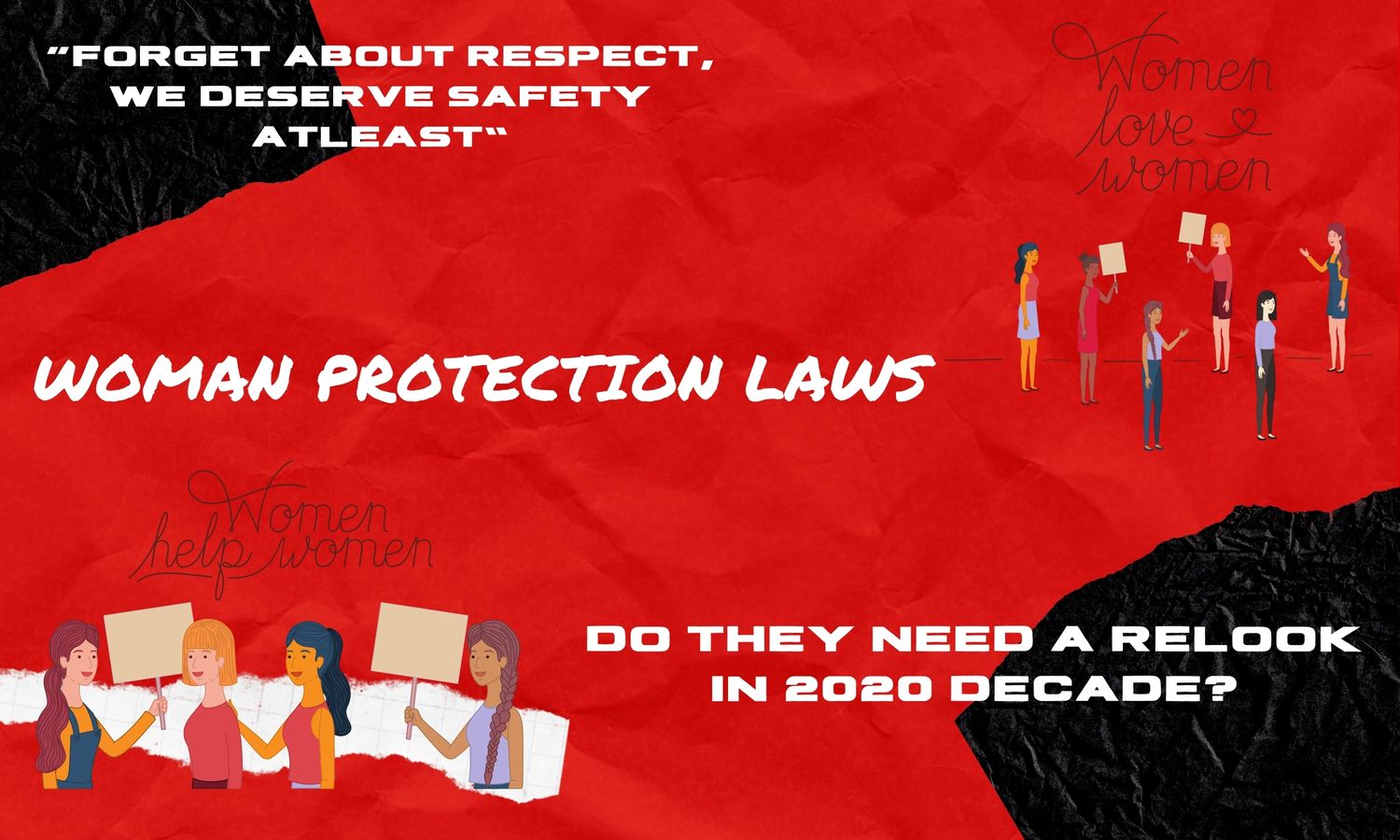Woman protection laws: Do they need a relook in 2020 decade?
Woman protection laws: Do they need a relook in 2020 decade?
By-Mehak Datta

“FORGET ABOUT RESPECT, WE DESERVE SAFETY ATLEAST”
In Indian society, woman involves a crucial position and admired spot. The Vedas celebrated women as the mother, the maker, and one who gives life and revered her as Devi or Goddess. Women in India, today, are turning into the most helpless area undoubtedly. Violence against women can fit into a few general classifications. Some of them are assault, aggressive domestic abuse, sexual harassment, female child infanticide and so forth.
Our nation must have the biggest number of laws, apparently to serve women. The Constitution and the various Acts passed by the Union Governments and the states give exceptional insurance to women, mindful of their frail position. Despite every one of these bits of enactment stacked for women, their condition is improving just at a snail’s pace.
While article 15(1) denies the state from segregating based on religion, race, case, sex, or spot of birth, article 15(3) permits the state to make unique arrangements for women and kids. Article 15 just expounds that equivalent idea and recognizes that women need extraordinary treatment for their up liftmen.
Article 16 gives fairness of chance to all residents in issues identifying with work or arrangement to any office under the State. In C. B. Muthamma v. Association of India the Supreme Court held that an arrangement of the administration rules requiring a female worker to acquire consent to get authorization of the legislature recorded as a hard copy before getting hitched and denying her the option to be advanced on the ground of her being hitched was biased.
Other than these sacred arrangements, there are a few laws implied for the assurance and advantage of women.
LEGAL PROVISIONS
DOWARY Prohibition Act, 1961
The reason for this Act is to forestall the giving or taking of endowment. It punishes this go about as well as makes the demonstration of requesting endowment an offense.
The Medical Termination of Pregnancy Act, 1971
This Act accommodates the end of specific pregnancies by enrolled clinical experts and for issues associated therewith or coincidental thereto.
The Hindu Succession Act, 1956 with correction in 2005
This Act accommodated equivalent legacy rights to women just because. It abrogated the idea of constrained bequest of women.
The Protection of Women from Domestic Violence Act, 2005
Aggressive behaviour at home Act intended to accommodate increasingly powerful assurance of the privileges of women ensured under the Constitution who are survivors of violence of any sort happening inside the family and for issues associated therewith or accidental thereto.
The Commission of Sati (Prevention) Act 1987
Its item is to forestall the act of Sati and the glorification of such a demonstration. An endeavour to submit Sati is additionally culpable in specific situations.
But the real question is do we really need these laws even today? DOWARY Prohibition Act,1961 is being misused by the women. The Supreme Court composed in the latest multi day stretch of July that no quick and brief catch will be made under dowry harassment laws. Some place in the scope of three years earlier it had seen that adversary of dowry harassment laws were being used by disappointed life partners as weapons instead of as shields. What is of concern is that the Supreme Court has in every way that really matters grasped and legitimized the speculation that women distort and make records of violence in order to search for reprisal against their life partners and conjugal families, thusly giving a handle to specific people to put cash on the Supreme Court to show the viewpoint that women misuse the laws.
Same goes for the Protection of Women from Domestic Violence Act, 2005 as most of the women who are actually the victim are not able to reach the police for her security and the ones who do not require it are misusing it for their own benefits.
Yes, women safety is required but the laws that are being used since 90s need to change because this isn’t 90s and women need better and new laws for their safety.